 Petzlover
Petzlover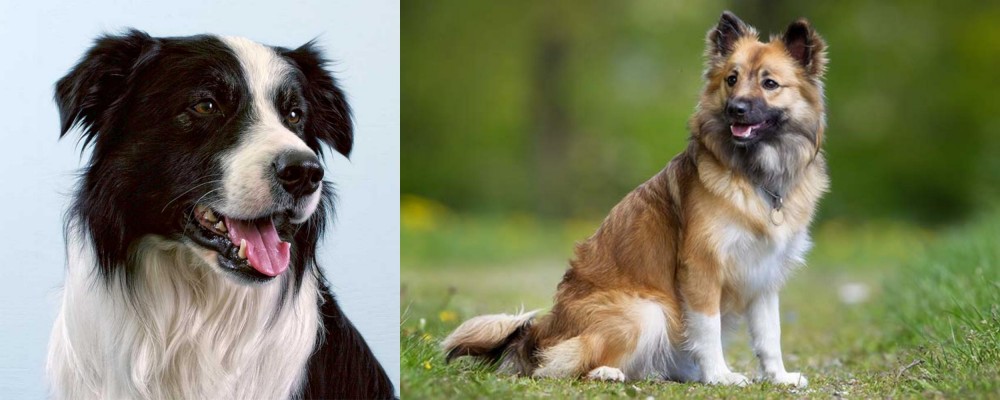 Border Collie is originated from United Kingdom but Icelandic Sheepdog is originated from Iceland. Border Collie may grow 11 cm / 5 inches higher than Icelandic Sheepdog. Border Collie may weigh 6 kg / 14 pounds more than Icelandic Sheepdog. Border Collie may live 3 years more than Icelandic Sheepdog. Both Border Collie and Icelandic Sheepdog has same litter size. Both Border Collie and Icelandic Sheepdog requires Moderate Maintenance.
Border Collie is originated from United Kingdom but Icelandic Sheepdog is originated from Iceland. Border Collie may grow 11 cm / 5 inches higher than Icelandic Sheepdog. Border Collie may weigh 6 kg / 14 pounds more than Icelandic Sheepdog. Border Collie may live 3 years more than Icelandic Sheepdog. Both Border Collie and Icelandic Sheepdog has same litter size. Both Border Collie and Icelandic Sheepdog requires Moderate Maintenance.
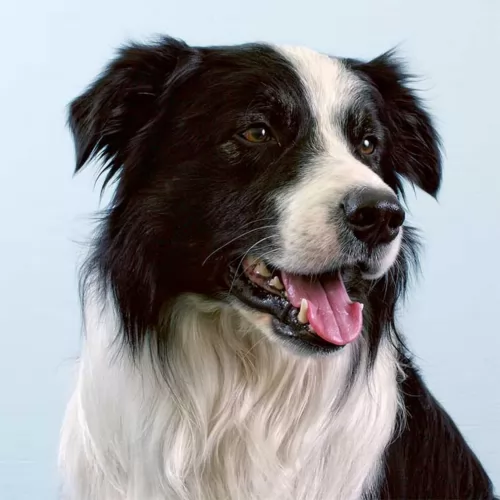 The Border Collie originated in Northumberland and was used to herd livestock. He is particularly well known for his intense stare in controlling the sheep in his care. The name Border Collier wasn’t used until 1915. This was so that the dog could be registered as a separate breed together with other Collie breeds already registered.
The Border Collie originated in Northumberland and was used to herd livestock. He is particularly well known for his intense stare in controlling the sheep in his care. The name Border Collier wasn’t used until 1915. This was so that the dog could be registered as a separate breed together with other Collie breeds already registered.
Sheepdog trials have been held since 1873. The very name of this dog gives you an inkling as to his heritage, as the word ‘Collie’ refers to sheepdogs and comes from Scottish dialect. Today the Border Collie is recognized as the ultimate sheep-herding dog, with his amazing intelligence and herding skills. The Border Collie was recognized by the American Kennel Club in October 1995.
 There are quite a few different dog breeds that fall under the name of Spitz-type dogs, and in fact they have a number of similar characteristics, one of which is that they have some wolf-like features. They typically have the thick coat with undercoat and the erect, pointed ears and slanted eyes.
There are quite a few different dog breeds that fall under the name of Spitz-type dogs, and in fact they have a number of similar characteristics, one of which is that they have some wolf-like features. They typically have the thick coat with undercoat and the erect, pointed ears and slanted eyes.
There is definitely a strong link between the Spitz type dogs and wild wolves. The tail too is feathery and can curl over the back of the dog.
The Icelandic Sheepdog, a native dog to Iceland, is a Spitz type dog which originates from the dogs brought to Iceland by the Vikings. The dogs have always been used to herd sheep, and they resemble dogs found in graves in Sweden and Denmark.
The dog at one time was facing extinction in the late 20th century, but in 1969, the Icelandic Dog Breeder Association was established to restore and preserve the breed. The Icelandic Sheepdog gained AKC recognition in June 2010.
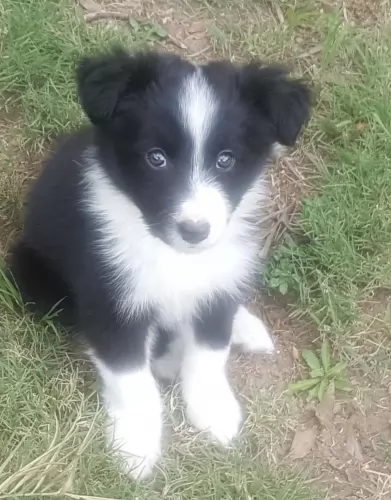 Utterly responsive, intelligent, alert and keen, the medium sized border collie loves nothing more than to be actively working. He requires both mental and physical stimulation. The ideal height for this very intelligent dog is 46 – 53cm and they weigh in at about 14 – 22kg.
Utterly responsive, intelligent, alert and keen, the medium sized border collie loves nothing more than to be actively working. He requires both mental and physical stimulation. The ideal height for this very intelligent dog is 46 – 53cm and they weigh in at about 14 – 22kg.
People who have been to sheepdog trials can only marvel a this dog and his intense stare, moving the sheep to precisely where his master wants them. The dog has a moderately long and smooth coat with a dense topcoat, with soft weather resistant undercoat. Most common color is black and white but other colors such as chocolate and white, liver and white or blue merle are also seen.
There are a few Border Collies which have a single-colour coat. He has a long feathery tail and the ears can be either erect, semi-erect and in some instances, even dropped. He has brown eyes but sometimes with the Merle Border Collie you can get one eye or part of the eye which is blue.
Border Collies are playful, energetic dogs who just love living in homes where the family involves him in all their activities. Because he is so intelligent, he is demanding of his human family, wanting them to take notice of him and provide him with lots of clever games and sports. If he is left without involvement, he can become frustrated and destructive. That is why it is so important to choose your pet carefully.
These highly energetic dogs require owners who recognize this need and are prepared to provide him with lots of games, walks and runs.
 The Icelandic Sheepdog is a smallish to medium sized dog standing at 40 to 45cm in height and he can weigh anything between 9 and 14kg.
The Icelandic Sheepdog is a smallish to medium sized dog standing at 40 to 45cm in height and he can weigh anything between 9 and 14kg.
His double coat can be short or long, straight or wavy and in a mix of colors such as grey and white or tan and white, black, tan and white, cream or chocolate. Even though they come in a number of predominant colors, these colors are always accompanied by white markings.
He has a longish muzzle, much like the wolf, giving him an alert, foxy appearance. He has a muscular, rectangular body with strong, straight legs with dewclaws on both the front and hind legs.
Your social, energetic dog will require socialization and training which does him the world of good, turning him into a well-adjusted, obedient dog.
He is an intelligent dog, and training him won't be difficult as he is eager to please. These are social dogs which love being part of the family and they don't like being left outside day after day with little human intervention. He is a lively, confident breed, gentle and not at all aggressive.
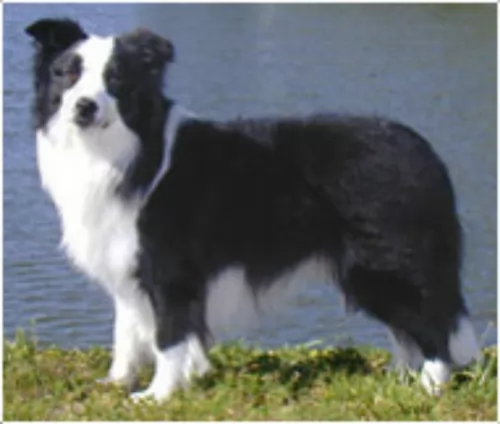 The Border Collie is such an awesome working dog breed, being of tremendous help to farmers. With their endless energy and stamina, given the chance he would want to be working all day. This medium sized dog will need a family where they are hard working and active just like him. He makes a wonderful pet with the right owners and if everyone is active in the family, he becomes your devoted soulmate.
The Border Collie is such an awesome working dog breed, being of tremendous help to farmers. With their endless energy and stamina, given the chance he would want to be working all day. This medium sized dog will need a family where they are hard working and active just like him. He makes a wonderful pet with the right owners and if everyone is active in the family, he becomes your devoted soulmate.
He is sensitive to what his owner wants and that is also because he is highly intelligent. Shower your wonderful pet with lots of love, give him lots of attention and plenty of activities, and you’ll have an awesome friend for life.
 The Icelandic Sheepdog is such a good all-round family pet. He is alert, intelligent, social, playful, loyal, loving and brave.
The Icelandic Sheepdog is such a good all-round family pet. He is alert, intelligent, social, playful, loyal, loving and brave.
He is friendly too, getting on well with children and any pets you have in the home. He is essentially a working dog, so you shouldn’t think of owning him as a pet if your lifestyle is centered around the TV and the couch for the best part of the day.
This is an energetic dog who wants lots of action during the day. He is a dog that badly wants to be part of the family and in exchange for looking after him well, he’ll promise to be an exceptional pet.
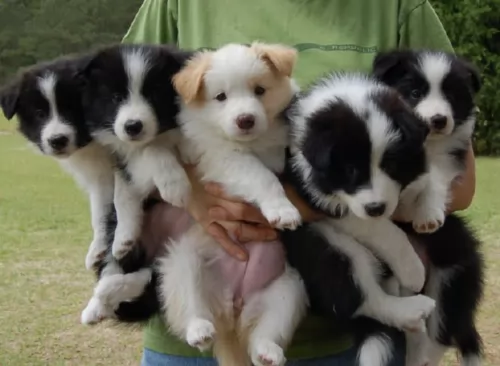 If your Border Collie is healthy, he can live to be 14 years of age and longer. There are one or two dog ailments that are more common in this breed, so it is wise to be aware of what can go wrong, although with good care it is highly unlikely.
If your Border Collie is healthy, he can live to be 14 years of age and longer. There are one or two dog ailments that are more common in this breed, so it is wise to be aware of what can go wrong, although with good care it is highly unlikely.
Primary epilepsy, known as idiopathic epilepsy can be seen in your dog before the age of 5 years, and although a genetic link in border collies has not yet been identified, idiopathic epilepsy is more prevalent in some breeds. Seizures in your dog are caused by electrical disturbances in the brain and treatment may be for life. While epilepsy in dogs can’t be cured, the condition can be managed with medication recommended by your vet and then he can lead a healthy life.
Collies are prone to developing hip dysplasia, which is an inherited condition with abnormal formation of the hip socket. For your pet it can mean lameness as well as painful arthritis. You’ll see your collie dog battling to rise after lying down. It is actually common in lots of dog breeds, but more so in larger breeds.
This is an inherited problem that can lead to your dog going blind. About 70 to 97% of collies in the UK and the United States are affected. Your veterinarian will examine your dog to determine the extent of the defect. It is common in the first year of a dog and can be be prevented if caught early.
 Your pet will reach 12 to 14 years of age with good care and is regarded as a generally healthy dog breed. However, they can be prone to a few health conditions, and these include hip dysplasia and diabetes.
Your pet will reach 12 to 14 years of age with good care and is regarded as a generally healthy dog breed. However, they can be prone to a few health conditions, and these include hip dysplasia and diabetes.
Mercifully for your pet, diabetes is considered a manageable disorder. When your pet doesn’t produce insulin or can’t utilize it normally, his blood sugar levels rise, resulting in hyperglycemia.
If left untreated, your pet can land up with a host of complicated health problems. Diabetes can be classified as either Type 1 or Type II, with the more common form in dogs being Type 1.
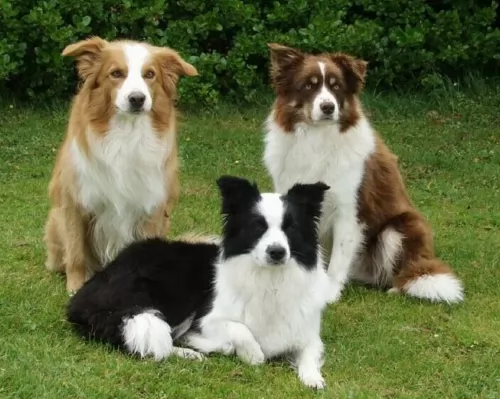 This is a dog that will need plenty of exercise and attention. He won’t do well cooped up in a tiny home. He’ll want lots of place to run and play and with his owners involved in his activities. It is unfair of any dog owner to buy a dog like this and then leave him so that he becomes distressed from being ignored.
This is a dog that will need plenty of exercise and attention. He won’t do well cooped up in a tiny home. He’ll want lots of place to run and play and with his owners involved in his activities. It is unfair of any dog owner to buy a dog like this and then leave him so that he becomes distressed from being ignored.
Do your dog a favor and see that he is socialized as a puppy and trained as he grows older. Once he has been trained, he becomes a super pet, obedient, sensitive and willing to please.
Border collies shed throughout the year, and with Summer his shedding becomes a bit more. He will require a good brushing at least twice a week to get rid of loose hairs and to ensure that the long hair doesn’t become tangled. He isn’t considered hypoallergenic and is regarded as a safe pet to have for people with allergies.
This high energy working dog will require top quality food from the top brands if you intend feeding him from commercially produced dog food. He will certainly need raw meat added to this food from time to time to ensure you stave off skin problems such as rashes. You can also add in rice, meat and vegetables for variety to ensure his is getting in all the minerals and vitamins he needs. Fresh, cool water should always be available to him day and night.
 Feed your energetic Icelandic Sheepdog a diet which is appropriate for his age and activity level. Don't just feed him the best commercially manufactured dog food, but give him some cooked chicken, brown rice and vegetables mixed into his kibble as a tasty treat. Also, dogs are carnivores, so include some raw meat into his diet from time to time. Clean, cool water should always be available.
Feed your energetic Icelandic Sheepdog a diet which is appropriate for his age and activity level. Don't just feed him the best commercially manufactured dog food, but give him some cooked chicken, brown rice and vegetables mixed into his kibble as a tasty treat. Also, dogs are carnivores, so include some raw meat into his diet from time to time. Clean, cool water should always be available.
The Icelandic Sheepdog has a thick double coat, with the outer coat being longer and the hair being shiny and glossy. These dogs shed quite a bit with seasonal shedding too so twice-weekly brushing will be necessary to keep the fur free of loose hair. His nails should also be checked regularly and his teeth should be brushed a couple of times a week too.
Icelandic Sheepdogs are athletic, active dogs that require a lot of exercise to keep them in good physical shape.
He loves all kinds of games and outdoor activities, one of which will be going with you for a walk every day. He makes a wonderful companion for those people going on long hikes.